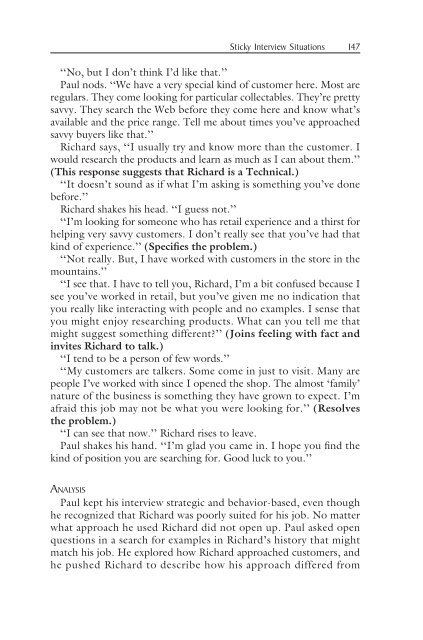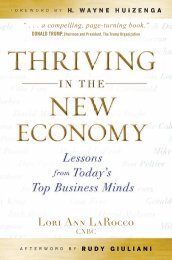Managing Sticky Situations at Work
Managing Sticky Situations at Work
Managing Sticky Situations at Work
Create successful ePaper yourself
Turn your PDF publications into a flip-book with our unique Google optimized e-Paper software.
<strong>Sticky</strong> Interview <strong>Situ<strong>at</strong>ions</strong> 147‘‘No, but I don’t think I’d like th<strong>at</strong>.’’Paul nods. ‘‘We have a very special kind of customer here. Most areregulars. They come looking for particular collectables. They’re prettysavvy. They search the Web before they come here and know wh<strong>at</strong>’savailable and the price range. Tell me about times you’ve approachedsavvy buyers like th<strong>at</strong>.’’Richard says, ‘‘I usually try and know more than the customer. Iwould research the products and learn as much as I can about them.’’(This response suggests th<strong>at</strong> Richard is a Technical.)‘‘It doesn’t sound as if wh<strong>at</strong> I’m asking is something you’ve donebefore.’’Richard shakes his head. ‘‘I guess not.’’‘‘I’m looking for someone who has retail experience and a thirst forhelping very savvy customers. I don’t really see th<strong>at</strong> you’ve had th<strong>at</strong>kind of experience.’’ (Specifies the problem.)‘‘Not really. But, I have worked with customers in the store in themountains.’’‘‘I see th<strong>at</strong>. I have to tell you, Richard, I’m a bit confused because Isee you’ve worked in retail, but you’ve given me no indic<strong>at</strong>ion th<strong>at</strong>you really like interacting with people and no examples. I sense th<strong>at</strong>you might enjoy researching products. Wh<strong>at</strong> can you tell me th<strong>at</strong>might suggest something different?’’ (Joins feeling with fact andinvites Richard to talk.)‘‘I tend to be a person of few words.’’‘‘My customers are talkers. Some come in just to visit. Many arepeople I’ve worked with since I opened the shop. The almost ‘family’n<strong>at</strong>ure of the business is something they have grown to expect. I’mafraid this job may not be wh<strong>at</strong> you were looking for.’’ (Resolvesthe problem.)‘‘I can see th<strong>at</strong> now.’’ Richard rises to leave.Paul shakes his hand. ‘‘I’m glad you came in. I hope you find thekind of position you are searching for. Good luck to you.’’ANALYSISPaul kept his interview str<strong>at</strong>egic and behavior-based, even thoughhe recognized th<strong>at</strong> Richard was poorly suited for his job. No m<strong>at</strong>terwh<strong>at</strong> approach he used Richard did not open up. Paul asked openquestions in a search for examples in Richard’s history th<strong>at</strong> mightm<strong>at</strong>ch his job. He explored how Richard approached customers, andhe pushed Richard to describe how his approach differed from















